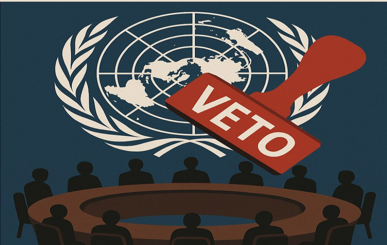Strategizing from 7 cities across the globe
Vetoing Liberty: The UNSC's Struggle with the Veto Power
The United Nations aimed to overcome the limitations of the League of Nations by adjusting bodies like the Security Council, where influential countries could collaborate to preserve peace. To facilitate this cooperation, the veto power for the permanent members was introduced as a pragmatic measure to ensure their participation and prevent another collapse of international governance. However, the UN's effectiveness is limited by the veto power, which enables certain countries to prevent action, even in times of crisis.
INTERNATIONAL LAWPOLITICSDEMOCRACYUNITED NATIONS
Nour Hachem
4/9/20257 min read


After World War II, the world faced immense destruction and suffering, revealing the League of Nations' failure to prevent conflict. The war's humanitarian and economic repercussions emphasized the need for a system to mediate disputes and foster cooperation among nations, resulting in the creation of the United Nations. The United Nations aimed to overcome the limitations of the League of Nations by adjusting bodies like the Security Council, where influential countries could collaborate to preserve peace. To facilitate this cooperation, the veto power for the permanent members was introduced as a pragmatic measure to ensure their participation and prevent another collapse of international governance. However, the UN's effectiveness is limited by the veto power, which enables certain countries to prevent action, even in times of crisis. This disconnects between the UN's ideals and its actions demands a reassessment of its effectiveness and a push for reforms.
Prioritizing power and wealth over justice
The veto power is one of the most controversial powers in the UN. Although it has its advantages, it has been criticized for frequently paralyzing the Security Council. The veto power enables premanent members to block resolutions that may not align with their strategic or economic interests, even when the resolutions are supported internationally, undermining the UN’s goals. It often results in deadlocks on urgent global issues, such as conflicts, humanitarian crises, and human rights violations. For instance, The United States and Russia have both used their veto power at the UN to protect their allies and advance their national interests; The US has historically shielded Israel from resolutions condemning its actions in the Palestinian territories, reflecting the strong political and financial ties between the two nations. This has been happening since 1967; the United States has vetoed the Security Council’s resolutions condemning all Israeli settlements established in occupied Palestinian territory. In November 2024, the UN vetoed a resolution that called for an immediate humanitarian ceasefire in Gaza as it didn’t include the release of hostages held by Hamas. US Ambassador Linda Thomas-Greenfield stated that supporting a ceasefire amid ongoing negotiations may not lead to a lasting peace.
The E10, a group of the council’s 10 elected members, put the resolution forward at Algeria’s urging. The North African country is the Security Council’s de facto representative for the Palestinians and the Arab and Muslim world. Amar Bendjama, Algeria’s envoy to the global body, called it a “sad day” for the council and claimed that the Jewish state has “impunity in this chamber.” This situation exposed the weaknesses of the UN Security Council, where the interests of permanent members can prevent timely and coordinated action on global issues.
Exposing Hypocrisy, Bias, and Skewed Realities
“Grossly unfair," Malaysian Prime Minister Anwar Ibrahim described the veto system, where he highlights the lack of representation from regions like Africa and Latin America in the council's decision-making process.
The selective use of the veto power by permanent members of the Security Council often undermines the credibility of the UN. While these nations promote human rights and democracy, they may utilize their veto to shield their allies or their own actions from international accountability. For instance, the US has promoted democracy worldwide but has vetoed resolutions criticizing its allies, creating a double standard that weakens the UN's authority. This has been brought up as an issue and criticized by Australian officials that have expressed concerns about the use of veto power within the UNSC. They particularly highlighted instances where it has been employed to block actions addressing international conflicts. For example, Foreign Minister Penny Wong reproached Russian President Vladimir Putin's use of the veto to shield Russia's actions in Ukraine, labeling it "the act of a coward." She emphasized that such use of the veto undermines the principles of the UN Charter and called for reforms to ensure the UNSC can effectively uphold international law. Since the Syrian civil war began in 2011, Russia and China have consistently used their veto power in the UN Security Council to block resolutions condemning the Syrian government's actions and implementing sanctions. For example, in 2012, both countries vetoed a resolution condemning the Syrian regime's crackdown on protesters, a move Amnesty International called a "shockingly callous betrayal of the people of Syria." This pattern of vetoing resolutions aimed at addressing the humanitarian crisis and holding the Syrian government accountable for alleged war crimes has continued. Critics argue that these vetoes have enabled ongoing violence and sabotaged international efforts to protect civilians. The use of the veto in the Syrian context has led to accusations of hypocrisy against the UN Security Council. The veto system inherently skews the Security Council's decisions, allowing a single nation to override the collective will of the international community. Such actions can stall critical interventions in humanitarian crises, perpetuating suffering and instability. This bias is evident and some may say the veto is the most undemocratic element of the UN, as well as the main cause of inaction on war crimes and crimes against humanity. It is a tool used to abuse power.
The Double Veto: A Barrier to Global Action and Accountability
The concept of a "double veto" arises when a permanent member vetoes a resolution to prevent another member's veto from being overridden. It occurs when a permanent member first vetoes a resolution then uses its veto power again to block any procedural attempts to override the initial veto. For example, in discussions on the Ukraine crisis, Russia has repeatedly used its veto to prevent resolutions condemning its actions, while other permanent members remain powerless to override it, resulting in a deadlock. Usually, the veto power comes into action on substantive issues, which involve significant matters affecting international peace, security, and cooperation, requiring in-depth discussion and negotiation, such as sending peacekeepers or imposing sanctions. This opposes procedural issues, which involve setting a meeting for example – minor details that can’t be blocked by veto power. For instance, in February 2012, Russia and China exercised a “double veto” to block a resolution on Syria. First, they classified the draft resolution as substantitve, which allows them to veto it as they declare it to be a “big deal”, overriding the procedural classification. In 2022, we saw this tactic during the Russia and Ukraine crisis where Russia used its veto power to block a UN resolution condemning its invasion of Ukraine, which was classified as a breach of international law. Not only did they veto the resolution itself, but they also blocked the resolution from being sent to the UN General Assembly for further discussion. This stalls any meaningful response and resolution from the UN, preventing action on urgent crises and shielding aggressors from accountability.
Other International Entities as Battlegrounds: Regional Organizations and Global Power Struggles
The UN was meant to be a neutral forum for diplomacy and cooperation, but over time, it has become a battleground for competing regional and international organizations like BRICS, the European Union, and others. These different regional organizations challenge the dynamic of the UN. For example, the US and its allies often clash with Russia and China, leading to deadlocks within key bodies of the UN such as the Security Council. These regional organization act as powerful coalitions, as they give smaller states more influence and turn UN negotiations into contests between blocs instead of individual nations. This is evident in issues like economic reform, where the BRICS nations advocate for reducing Western financial dominance, while the EU and the US support existing global financial institutions, like the World Bank. Another instance where we saw this phenomenon was in 2011 during the start of the Syrian civil war. The BRICS countries (Brazil, Russia, India, China, and South Africa) have often worked together on their positions at the UN, especially in the Security Council. Russia and China, as permanent members, have repeatedly used their veto power to block resolutions supported by Western countries that would have imposed sanctions on the Syrian government or taken authorized military action. For example, in 2012, a UN resolution written by Western and Arab countries proposed stricter sanctions against the Syrian government because of human rights abuses. However, Russia and China blocked the resolution, arguing that it was foreign interference and violated Syria's sovereignty. Brazil, India, and South Africa, although not permanent members at the time, generally supported the BRICS position. They favored talking things out rather than punishing the Syrian government.
The veto power that is held by the five permanent members (P5) frequently impedes crucial decisions, delaying timely responses to global crises and humanitarian emergencies. The veto, designed to foster consensus, ironically often paralyzes the Security Council, hindering its ability to respond effectively to global crises. This situation raises important questions about the UN's impartiality and how power dynamics influence international governance, making the analysis of veto power a crucial and urgent matter. Reforming this system to address these issues has become increasingly essential for the UN to fulfill its mission in the modern geopolitical landscape. Without meaningful reform, the ideals of the UN will remain overshadowed by the self-interest of the few, leaving urgent global challenges unanswered. Therefore, if the UN was created to prevent conflicts, then why does its own system allow the most powerful nations to decide which wars deserve action and which are ignored? Can we now say that the UN is an ineffective institution where power overrides justice and democracy is merely an illusion?
References:
Global Policy Forum. (2016). Use and misuse of veto power in the UN Security Council. Retrieved from https://www.globalpolicy.org
United Nations. (2024). General Assembly debates veto initiative as Security Council faces persistent deadlock. Retrieved from https://press.un.org/en/2024/ga12593.doc.htm
Francis, D. (2024). Statement on the veto initiative. Seventy-eighth session of the United Nations General Assembly.
Al Jazeera. (2021, May 19). A history of the US blocking UN resolutions against Israel. https://www.aljazeera.com/news/2021/5/19/a-history-of-the-us-blocking-un-resolutions-against-israel
Gabbatt, A. (2012, July 19). Russia and China veto of Syria sanctions condemned as 'indefensible'. The Guardian. https://www.theguardian.com/world/2012/jul/19/russia-china-syria-sanction-veto
Harris, P., Chulov, M., Batty, D., & Pearse, D. (2012, February 4). Syria resolution vetoed by Russia and China at United Nations. The Guardian. https://www.theguardian.com/world/2012/feb/04/assad-obama-resign-un-resolution
Le Monde. (2024, November 21). Les Etats-Unis isolés après avoir mis leur veto à une résolution de l'ONU en faveur d'un cessez-le-feu à Gaza. https://www.lemonde.fr/international/article/2024/11/21/les-etats-unis-isoles-apres-avoir-mis-leur-veto-a-une-resolution-de-l-onu-en-faveur-d-un-cessez-le-feu-a-gaza_6407103_3210.html
